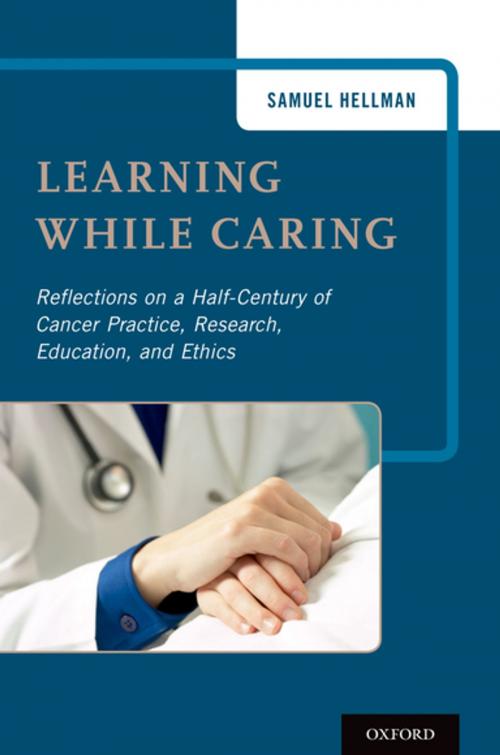Learning While Caring
Reflections on a Half-Century of Cancer Practice, Research, Education, and Ethics
Nonfiction, Health & Well Being, Medical, Specialties, Oncology, Reference, Ethics| Author: | Samuel Hellman | ISBN: | 9780190657000 |
| Publisher: | Oxford University Press | Publication: | November 10, 2016 |
| Imprint: | Oxford University Press | Language: | English |
| Author: | Samuel Hellman |
| ISBN: | 9780190657000 |
| Publisher: | Oxford University Press |
| Publication: | November 10, 2016 |
| Imprint: | Oxford University Press |
| Language: | English |
In the last half century, a revolution in biology and medicine has taken place, bringing about emerging practical, philosophical, and societal issues with which academia in general, and medicine and oncology in particular, must grapple. One witness to this revolution is Samuel B. Hellman, a radiation oncologist who has served as Dean of the Pritzker School of Medicine at the University of Chicago; Physician-in-Chief at Memorial Sloan Kettering Cancer Center; Chair of Radiation Therapy at Harvard Medical School; President of the American Society of Clinical Oncology; President of the American Society of Therapeutic Radiology and Oncology; and co-editor with Dr. Vincent DeVita of seven editions of Cancer: Principles and Practice of Oncology, the premier oncology text in the world. Learning While Caring offers a collection of Dr. Hellman's essays and articles, in which he delves into the issues brought about by advances and changes in medicine over the last fifty years. The essays are organized into five sections: Medical Ethics and Learning; Academic Medicine; Research; Perceptions of Cancer; and Heroes. Each section is introduced by a new commentary from Dr. Hellman on the historical aspects and current significance of the issues presented in that section's essays. Throughout, Dr. Hellman interweaves reflections on major aspects of his professional career and the times in which they occurred as examples of the challenges and controversies that confront oncology, medicine, and academia. The book concludes with "Summing Up," reviewing changes in medical practice and biological science and concluding that, despite these huge changes, certain things remain the same, especially the primary obligation of the doctor to the patient and the need to seek and test new knowledge. Dr. Hellman writes, "We are currently at the end of the beginning of the revolution in biology and medicine resulting from the understanding of how genetic information was passed generationally. Our capacities are far greater now but the essence of medical practice and our responsibility to the patient remains the same."
In the last half century, a revolution in biology and medicine has taken place, bringing about emerging practical, philosophical, and societal issues with which academia in general, and medicine and oncology in particular, must grapple. One witness to this revolution is Samuel B. Hellman, a radiation oncologist who has served as Dean of the Pritzker School of Medicine at the University of Chicago; Physician-in-Chief at Memorial Sloan Kettering Cancer Center; Chair of Radiation Therapy at Harvard Medical School; President of the American Society of Clinical Oncology; President of the American Society of Therapeutic Radiology and Oncology; and co-editor with Dr. Vincent DeVita of seven editions of Cancer: Principles and Practice of Oncology, the premier oncology text in the world. Learning While Caring offers a collection of Dr. Hellman's essays and articles, in which he delves into the issues brought about by advances and changes in medicine over the last fifty years. The essays are organized into five sections: Medical Ethics and Learning; Academic Medicine; Research; Perceptions of Cancer; and Heroes. Each section is introduced by a new commentary from Dr. Hellman on the historical aspects and current significance of the issues presented in that section's essays. Throughout, Dr. Hellman interweaves reflections on major aspects of his professional career and the times in which they occurred as examples of the challenges and controversies that confront oncology, medicine, and academia. The book concludes with "Summing Up," reviewing changes in medical practice and biological science and concluding that, despite these huge changes, certain things remain the same, especially the primary obligation of the doctor to the patient and the need to seek and test new knowledge. Dr. Hellman writes, "We are currently at the end of the beginning of the revolution in biology and medicine resulting from the understanding of how genetic information was passed generationally. Our capacities are far greater now but the essence of medical practice and our responsibility to the patient remains the same."















